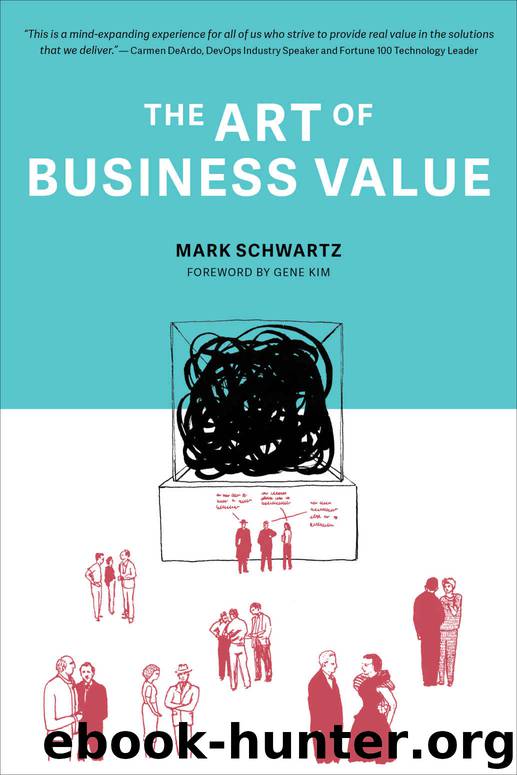The Art Of Business Value by Mark Schwartz

Author:Mark Schwartz
Language: eng
Format: mobi, epub
Tags: BUS041000, BUS083000
Publisher: IT Revolution
Published: 2016-03-29T14:00:00+00:00
Strategies and best practices can be embodied in rules. When and how do those rules become bureaucracy?
In one sense, they already are. According to Weber, “Bureaucratic administration means fundamentally the exercise of control on the basis of knowledge.”11 Similarly, John Stuart Mill considered bureaucracy just a form of administration that “accumulates experience, acquires well-tried and well-considered traditional maxims, and makes provision for appropriate practical knowledge in those who have the actual conduct of affairs.”12 In other words, it is simply a form of administration that captures knowledge in rules and makes it available to experts to apply. In a thought-provoking article for Harper’s Magazine, David Graeber argues that what we think of as government bureaucracy is actually just an inheritance from corporate rule making:
Americans often seem embarrassed by the fact that, on the whole, we’re really quite good at bureaucracy. It doesn’t fit our American self-image . . . if Americans are able to overlook their awkward preeminence in this field, it is probably because most of our bureaucratic habits and sensibilities— the clothing, the language, the design of forms and offices—emerged from the private sector.13
“Consider,” he says, “the maze of rules one must navigate if something goes even slightly awry with a bank account.” Interestingly, Karl Marx also expressed displeasure with bureaucracy—also because he viewed it as a quality of corporations and therefore capitalism. “The Corporation is civil society’s attempt to become state; but the bureaucracy is the state which has really made itself into civil society.”14
While disavowing rules, the Agile community is actually full of them. This is understandable, because rules are a way of bringing what is considered best practices into everyday processes. What would happen if we made exceptions to our rules—for instance, if we entertained the request: “John wants to head out for a beer now, instead of fixing the problem that he just introduced into the build?” If we applied the rules capriciously or based on our feelings, they would lose some of their effectiveness, right? That is precisely what we mean by sine ira et studio in bureaucracy. Mike Cohn, for example, tells us that “improving technical practices is not optional.”15 The phrase not optional sounds like another way of saying that the rule is to be applied “without anger or bias.” Mary Poppendieck, coauthor of the canonical works on Lean software development, uses curiously similar language in her introduction to Greg Smith and Ahmed Sidky’s book on adopting Agile practices: “The technical practices that Agile brings to the table—short iterations, test-first development, continuous integration—are not optional.”16 I’ve already mentioned Schwaber and Sutherland’s dictum that “the Development Team isn’t allowed to act on what anyone else [other than the product owner] says.”17 Please don’t hate me for this, Mike, Mary, Ken, and Jeff, but that is the voice of the command-and-control bureaucrat. “Not optional,” “not allowed,”—I don’t know about you, but these phrases make me think of No Parking and Curb Your Dog signs.
I understand where these kinds of statements come from. These
Download
This site does not store any files on its server. We only index and link to content provided by other sites. Please contact the content providers to delete copyright contents if any and email us, we'll remove relevant links or contents immediately.
Hit Refresh by Satya Nadella(9122)
The Compound Effect by Darren Hardy(8941)
Change Your Questions, Change Your Life by Marilee Adams(7756)
Nudge - Improving Decisions about Health, Wealth, and Happiness by Thaler Sunstein(7689)
The Black Swan by Nassim Nicholas Taleb(7105)
Deep Work by Cal Newport(7063)
Rich Dad Poor Dad by Robert T. Kiyosaki(6603)
Daring Greatly by Brene Brown(6501)
Principles: Life and Work by Ray Dalio(6415)
Playing to Win_ How Strategy Really Works by A.G. Lafley & Roger L. Martin(6225)
Man-made Catastrophes and Risk Information Concealment by Dmitry Chernov & Didier Sornette(6002)
Big Magic: Creative Living Beyond Fear by Elizabeth Gilbert(5753)
Digital Minimalism by Cal Newport;(5747)
The Myth of the Strong Leader by Archie Brown(5496)
The Slight Edge by Jeff Olson(5410)
Discipline Equals Freedom by Jocko Willink(5378)
The Motivation Myth by Jeff Haden(5203)
The Laws of Human Nature by Robert Greene(5170)
Stone's Rules by Roger Stone(5080)
